In this article, you will know the B.EL.Ed First Year Syllabus valid for Bundelkhand University, Jhansi students pursuing this teaching course.
Download the PDF At the end of this article.
Child Development
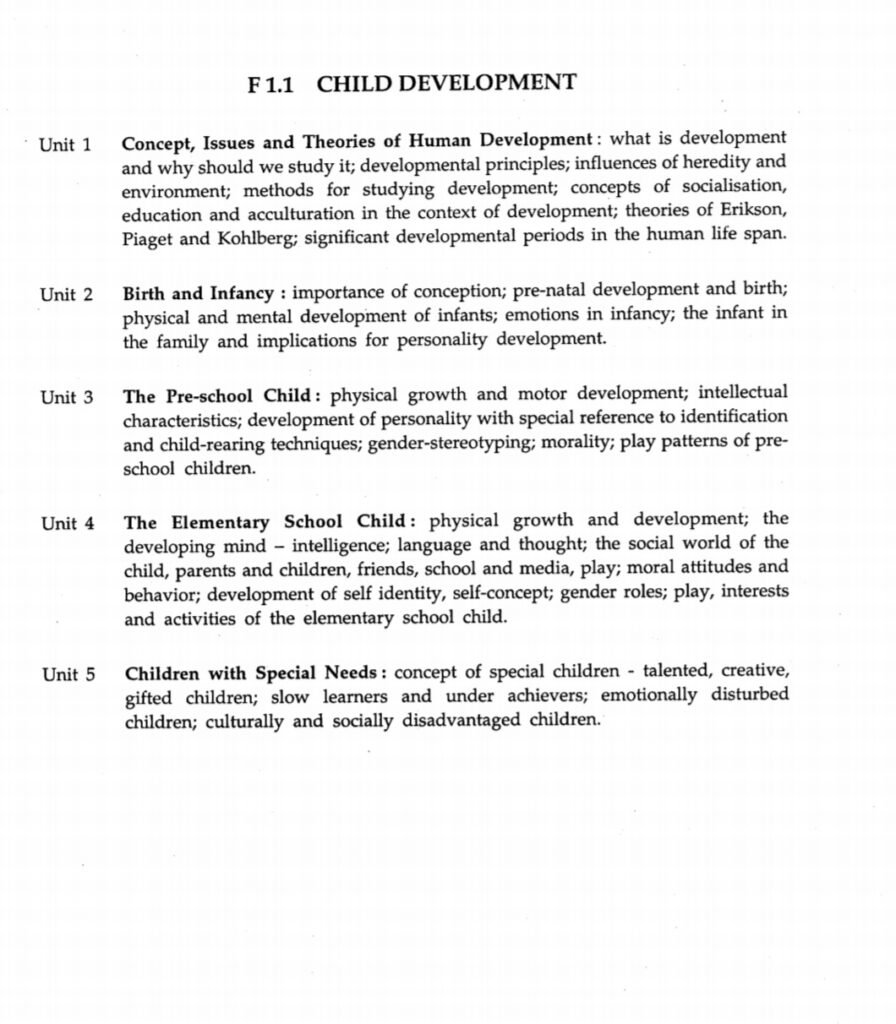
UNIT 01 –
Concept, Issues, and Theories of Human Development: what is the development and why should we study it;
developmental principles; influences of heredíty and environment; methods for studying development; concepts of socialization, education, and acculturation in the context of development; theories of Erikson, Piaget, and Kohlberg; significant development periods in the human life span.
UNIT 02 –
Birth and Infancy: the importance of conception; prenatal development and birth; physical and mental development of infants; emotions in infancy; the infant in the family and implications for personality development.
UNIT 03 –
The Pre-school Child: physical growth and motor development; intellectual characteristics; development of personality with special reference to the identification and child-rearing techniques; gender stereotyping; morality; play patterns of pre-school children.
UNIT 04 –
The Elementary School Child: physical growth and development; the developing mind – intelligence, language and thought; the social world of the child – parents and children, friends, school and media, play; moral attitudes and behavior; development of self-identity, self-concept; gender roles; play, interests, and activities of the elementary school child.
UNIT 5 –
Children with Special Needs: concept of special children – talented, creative, gifted children; slow learners and underachievers; emotionally disturbed children; culturally and socially disadvantaged children.
Contemporary India
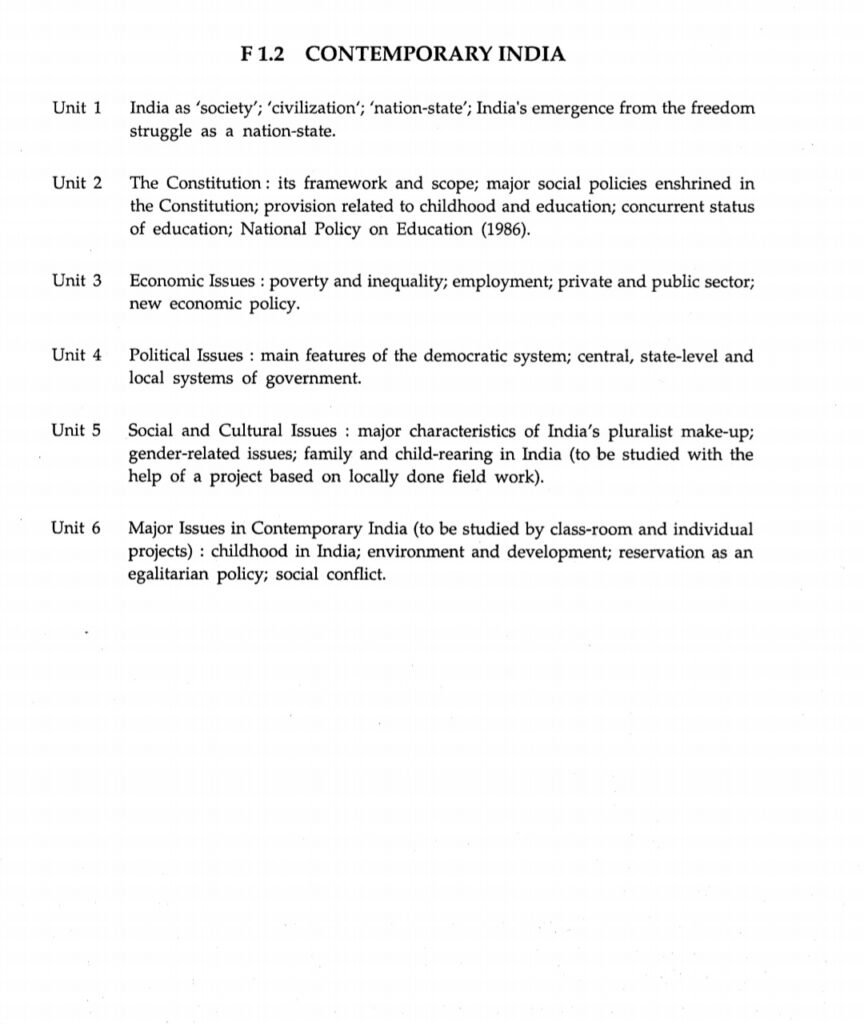
UNIT 01 –
India as ‘society’; ‘civilization’; ‘nation-state’; India’s emergence from the freedom struggle as a nation-state.
UNIT 02 –
The Constitution: its framework and scope; major social policies enshrined in the Constitution; provision related to childhood and education; concurrent status of education; national policy on education (1986).
UNIT 03 –
Economic Issues: poverty and inequality; employment; private and public sector; new economic policy.
UNIT 04 –
Political Issues: main features of the democratic system; central, state-level, and local systems of government.
UNIT 05 –
Social and Cultural Issues: the major characteristics of India’s pluralist make-up; gender-related issues; family and child-rearing in India (to be studied with the help of a project based on locally done fieldwork).
UNIT 06 –
Major Issues in Contemporary India (to be studied by classroom and individual projects) :
childhood in India; environment and development; reservation as an egalitarian policy; social conflict.
Nature Of Language
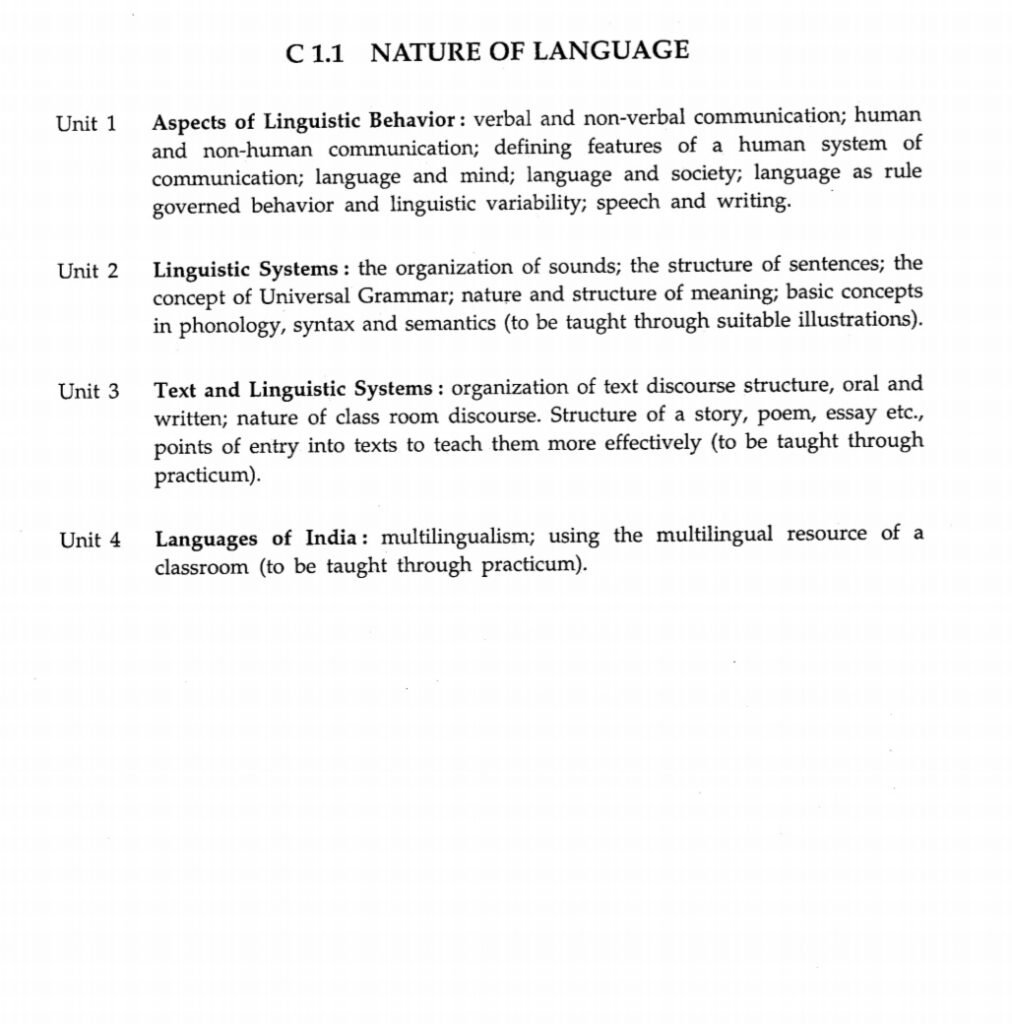
50 Marks
UNIT 01 –
Aspects of Linguistic Behavior: verbal and non-verbal communication; human and non-human communication; defining features of a human system of communication; language and mind; language and society; language as rule-governed behavior and linguistics variability; speech and writing.
UNIT 02 –
Linguistic Systems: the organization of sounds; the structure of sentences; the concepts of Universal Grammar; nature and structure of meaning; basic concepts in phonology, morphology, syntax, and semantics (to be taught through suitable illustrations).
UNIT 03 –
Text and Linguistic Systems: organization of text discourse structure, oral and written; nature of classroom discourse. Structure of a story, poem, essay, etc. points of entry into texts to teach them more effectively to be taught through practicum).
UNIT 04 –
Languages of India: multilingualism; using the multilingual resource of a classroom (to be taught through practicum).
Core Mathematics
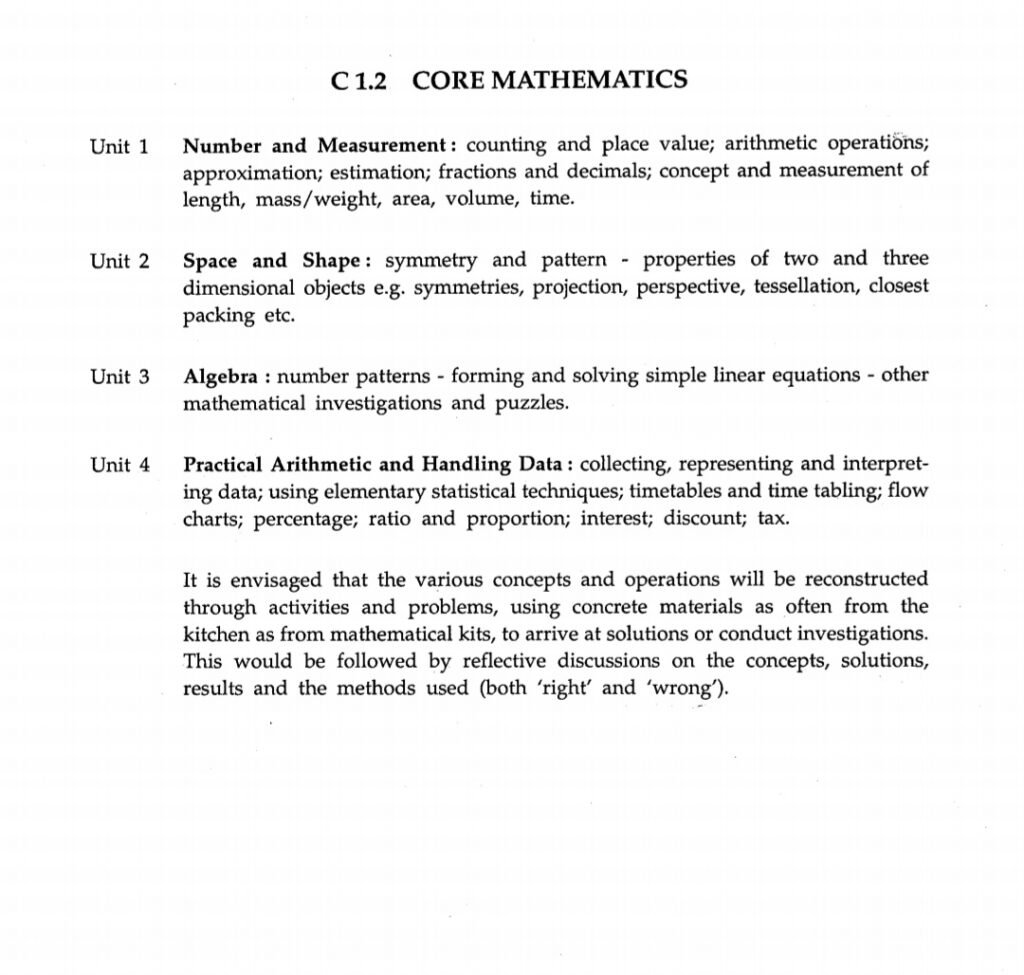
50 Marks
UNIT 01 –
Number and Measurement: counting and place value; arithmetic operations; approximation; estimation; fractions and decimals; concept and measurement of length, mass/weight, area, volume, time.
UNIT 02 –
Space and Shape: symmetry and pattern – properties of two and three-dimensional objects e.g. symmetries, projection, perspective, tessellation, closest packing, etc.
UNIT 03 –
Algebra: number patterns – forming and solving simple linear equations – other mathematical investigations and puzzles.
UNIT 04 –
Practical Arithmetic and Handling Data: collecting, representing, and interpreting data; using elementary statistical techniques; timetables and timetabling; flow charts; percentage; ratio and proportion; interest; discount; tax.
It is envisaged that the various concepts and operations will be reconstructed through activities and problems, using concrete materials as often from the kitchen as from mathematical kits, to arrive at solutions or conduct investigations.
This would be followed by reflective discussions on the concepts, solutions, results, and the methods used (both ‘right’ and ‘wrong’).
Core Natural Science
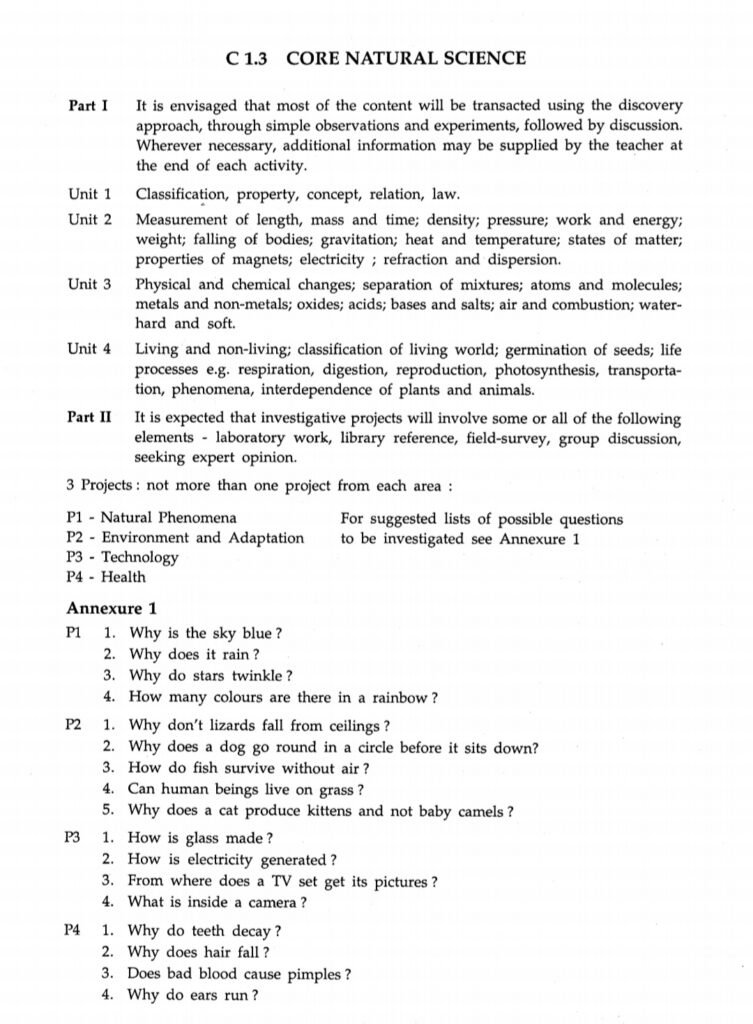
UNIT 01 –
Classification, property, concept, relation, law.
UNIT 02 –
(PHYSICS)
Measurement of length, mass and time; density; pressure; work and energy; weight; falling of bodies; gravitation; heat and temperature; states of matter; properties of magnets, electricity; refraction, and dispersion.
UNIT 03 –
(CHEMISTRY)
Physical and chemical changes; separation of mixtures; atoms and molecules; metals and non-metals, oxides; acids; bases and salts, air and combustion; water- hard and soft.
UNIT 04 –
(BIOLOGY)
Living and non-living; classification of the living world; germination of seeds, life processes e.g. respiration, digestion, reproduction, photosynthesis, transportation, phenomena, the interdependence of plants and animals.
ANNEXURE 1
P1
1. Why is the sky blue?
2. Why does it rain?
3. Why do stars twinkle?
4. How many colors are there in a rainbow?
P2-
1. Why don’t lizards fall from ceilings?
2. Why does a dog go round in a circle before it sits down?
3. How do fish survive without air?
4. Can human beings live on grass?
5. Why does a cat produce kittens and not baby camels?
P3 –
1. How is glass made?
2. How is electricity generated?
3. From where does a TV set get its pictures?
4. What is inside a camera?
P4-
1. Why do teeth decay?
2. Why does hair fall?
3. Does bad blood cause pimples?
4. Why do ears run?
Core Social Science
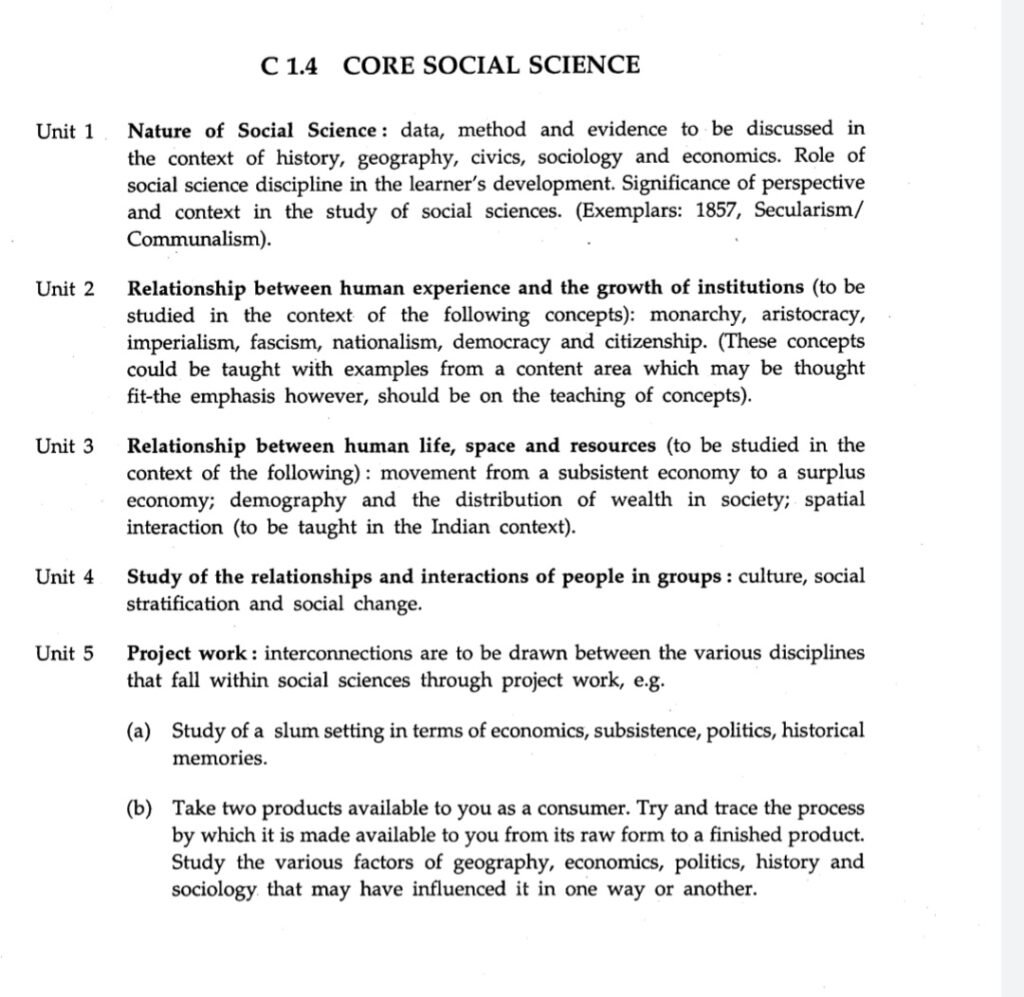
50 Marks
UNIT 01 –
Nature of Social Science: data, method, and evidence to be discussed in the context of history, geography, civics, sociology, and economics. Role of social science discipline in the learner’s development. Significance of perspective and context in the study of social science. (Exemplars: 1857, Secularism/Communalism).
UNIT 02 –
Relationship between human experience and the growth of institutions to be studied in the context of the following concepts, monarchy, aristocracy, imperialism, fascism, nationalism, democracy, and citizenship.
(These concepts could be taught with examples from a content area which may be thought fit-the emphasis, however, should be on the teaching of concepts.)
UNIT 03 –
Relationship between human life, space, and resources to be studied in the context of the following: movement from a subsistent economy to a surplus economy; demography and the distribution of wealth in society; spatial interaction to be taught in the Indian context).
UNIT 04 –
Study of the relationships and interactions of people in groups: culture, social stratification, and social change.
UNIT 05 –
Project work: interconnections are to be drawn between the various disciplines that fall within social sciences through project work, e.g. (a) Study of a slum setting in terms of economics, subsistence, politics, historical memories.
(b) Take two products available to you as a consumer.
Try and trace the process by which it is made available to you from its raw form to a finished product. Study the various factors of geography, economics, politics, history, and sociology that may have influenced it in one way or another.
Download PDF (Syllabus & Pattern) for B.El.Ed First Year in Hindi and English Medium: – https://drive.google.com/file/d/13LK7uNQrbVTgycDo1D1EKOs-oOp2OYzL/view?usp=sharing
